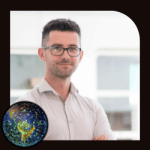Abstracts

DigiED: Futures – Conference Event 2022
Wed 30th March | 10:00 – 16:00
Below you will find more detailed information about each of the presentations. Please click on one of the presentation toggle boxes to expand and read more information.
Morning Sessions (AM)
Stream 1
10:00 - 10:10 | Welcome Talk | Prof. Liz Mossop & Andy Beggan
The days events will be started with a welcome message from Prof. Liz Mossop (DVC) & Andy Beggan (Dean of Digital Education). We invite you to join us for this introduction to the event.
10:20 – 10:35 | Enhancing the digital student experience through the curriculum | Presentation
Presenter:

Jamie Mitchell
Abstract:
The Digital Student Experience (DSE) team has been working with academic staff to promote student involvement in the curriculum across several programmes at the University of Lincoln. Recently we have worked successfully with the School of Health & Social Care, collaborating with Nursing students to create digital resources and an online nursing placements hub to enhance support available to them prior to starting placements.
The development of these peer-to-peer support resources has been led by a (mature) student nurse as part of her own assessed placement. She has worked with the Nursing Clinical team, students and the DSE team to create content for the placements hub, advising on what support is needed and encouraging other students to contribute their own stories. This hub will replace individual guides on starting placements and will be embedded into the curriculum as a ‘one-stop-shop’ for student nurses going on placement, something that has proven stressful and difficult for students in previous years.
This project has shown that students can successfully be given responsibility to contribute to their programme in a meaningful way, enhance the broader student experience and give them valuable employability skills all within the curriculum. We will be building on the success of this pilot to develop and launch a practical module with PG students developing and delivering similar student-led projects to enhance the digital student experience within a PGCert in Education, due to be launched in 2022/23.
10:45 – 11:00 | A Corporate Social Responsibility (CSR) focused Mentoring Program Managed by an Online Mentoring Platform | Presentation

Presenter: Patricia Pearlman-Dee
Abstract:
At Alliance Manchester Business School (AMBS) it was identified from a post graduation survey that certain groups of students on specific programs were lagging behind their peers in employment and salary post graduation.
The university has a wide and varied career service offering, focusing on equality, inclusivity and many other support services and initiatives to promote employability. It was however clear that something else was needed to try to support this identified group.
A group headed up by the Employability Lead of AMBS, explored the idea of a mentoring program. AMBS do not currently have a formal mentoring program. A mentoring program is not new, but what is making this new mentoring program unique are two things;
- The focus on aligning CSR goals of organisations with giving equitable and inclusive possibilities to students.
- The usage of a completely Online Mentoring platform.
This presentation will analyse and describe how an Online Mentoring Platform was identified, selected and implemented for a Corporate Partner Mentoring Program Pilot.
The audience will take away a clear process of how an online platform was identified and evaluated for the specific purpose of mentoring, including evaluating building vs off the shelf.
The audience will also get an understanding of the mentoring programs were set up. The advantages as well a drawback that were identified in using an online platform, relying on data vs human interference. Specific finding of how automated matching versus self-selection will also be presented.
11:10 – 11:25 | Engaging Students and Researchers in their Development during a Pandemic: A Whole-Institution Response | Presentation



Presenters: (from left to right) Dr. Andrew Struan, Dr. Jennifer Boyle & Dr. Scott Ramsay
Abstract:
Engaging students in the development of their academic literacies and researcher skills requires that Learning Developers (LDs) and Researcher Developers (RD) place a strong emphasis on active, dynamic, collaborative and interactive pedagogies (Boyle et al., 2019; Struan, 2021). The impact of the Covid-19 pandemic caused a radical shift in LD and RD pedagogical practice; LDs and RDs became central in the sector’s response to student engagement and community building.
This paper analyses the response of the LD and RD departments within a Scottish Russell Group university. Utilising reflections and evaluation from almost twenty staff members across the two departments, the paper provides a systematic analysis of the implementation of emergency approaches to student and researcher development. The two departments are responsible for the academic and research development of all students – from pre-entry to postgraduate research – across the institution (roughly 35,000 students in total).
11:30 - 12:15 | You can go your own way: Digital as the Catalyst of 'Flexibility' and the Demise of Monolithic Curriculum | KEYNOTE
Presenter & Bio:

David White
David White is the Head of Digital Education at the University of the Arts London, President of the Association for Learning Technology and a Principal Fellow of the Higher Education Academy. He is best known for the Digital Visitors and Residents idea which provides a framework to explore modes of online engagement. David is a keen advocate for Open Educational Practices and a well-known thinker in online education. You can find out more about him and his work at daveowhite.com or follow him as @daveowhite in Twitter.
Abstract:
This talk will cover the following topics:
• You can’t put the flexibility toothpaste back in the tube: reviewing student feedback from the pandemic
• We are always in our bodies (even when we are online): Dealing with material practices in a ‘disembodied’ world
• Flipping the physical: Imagining all courses are digital courses (some of which spend part of the time in physical buildings)
• Flexibility as the enemy of belonging?: The desire for connection and community in desituated teaching
• New forms of curriculum in digital spaces
Stream 2
10:20 – 10:35 | Moving forward with Teaching and Learning- future approaches | Presentation
Presenter:

Dr Kate Strudwick
Abstract:
This paper discusses alternatives and innovations that can be considered for the development of Teaching and Learning in Higher Education. Across the sector, over the last two years, there have been exemplars of good practice, with transitions showing a shift to more blended, flexible or online learning. Such innovations have ensured in-person meaningful contact time alongside a focus on enhancing student learning experiences. Such developments have required Higher Education institutions to show greater flexibility, a sense of adaptability and an awareness of differential pedagogical approaches which could be added to their suite of provision. Such approaches need to maintain standards with quality assurances, work to embed inclusive learning across all aspects, and need to address some of the challenges through a broader lens, to fully appreciate what the future might look like for Higher Education. With a requirement for balanced conversations about how degrees are taught, movement away from assumptions of what traditional effective learning and assessments might look like, towards more creative formats, which reflect stakeholders views, requires a change of mindset. This may result in a reassessment of where and how students fit into such designs, and possibly a return to wider pedagogical debates on the value of Higher Education. There is a lot to think about when considering the next steps for teaching and Learning, but learning from each other’s practice and how dilemmas can be overcome is the first step in thinking ahead.
10:45 – 11:00 | Keeping the Cheese in the Sandwich: Ensuring Learner Mastery During Virtual Learning and Teaching Sessions | Presentation
Presenter:

Kevin L. Merry
Abstract:
In 2016, De Montfort University (DMU) adopted Universal Design for Learning (UDL) as its principle pedagogy in a major drive to enhance practice around Equality, Diversity and Inclusion (EDI). The UDL approach pioneered at DMU is known as the “Cheese Sandwich”. The Cheese Sandwich embeds the UDL principles of Engagement, Representation and Action & Expression as part of an approach to teaching that supports learner mastery via constructive alignment and the principles of flipped learning, making the time learners spend with teachers and peers critical to their successful learning. Since the time learners spend with teachers and peers is so critical in the Cheese Sandwich, concerns were raised that the pivot to remote virtual learning would attenuate the effectiveness of the Cheese Sandwich, especially when teaching live online sessions, with learners engaging at physical distance. In response the mnemonic PATTERNS? (Pre-work, Alignment, Teamwork, Technology, Engage/Evaluate, Replay, No barriers, Support, Questions) was created to support the application of the Cheese Sandwich during live online sessions. This presentation reports on the application of PATTERNS? and its continued utilisation beyond the pandemic. Since launching in 2020, >1500 staff have used PATTERNS? to deliver live online sessions, with feedback demonstrating how users have benefitted from the way in which PATTERNS? has enabled them to intentionally include important UDL pedagogic considerations in the design of their live online teaching. Such considerations relate to engaging students through collaboration, active and interactive learning, and enabling student choice and autonomy, with highlighted benefits maintained post-pandemic.
11:10 – 11:25 | The No-fly Flying Faculty: the Future for Inter-continental Partnership and Internationalisation| Presentation
Presenter:



Dr Jill Zhao, Mrs Doina Carter & Dr Jason Wiggin
Abstract:
A number of programmes in the School of Architecture and the Built Environment and the School of Design are established in a long-term partnership with School for Higher and Professional Education (VTC-SHAPE)in Hong Kong. The programmes include Architecture, Design for Event, Exhibition and Performance and Interior Architecture and Design. These programmes offer a joint teaching schedule partly delivered by local Hong Kong tutors, and partly delivered by a flying faculty comprised of Lincoln staff teaching across the two countries. Due to the pandemic, the flying faculty had no choice but to move all teaching to online delivery in a very short timeframe in both countries. This created many challenges in both maintaining teaching standards and improving the students learning experience in a digital realm.
This presentation reports on the initiatives that the flying faculty made to address these challenges and to maintain parity. Examples presented showcase the initiatives that took place in collaboration with Lincoln students, innovations that were made possible by extensive use of technology to share studio experiences and teaching and learning practices. This report reflects on the challenges and happy accidents in the process, and to share lessons learned, as well as to discuss opportunities embedded in the digital education future for cross-institutional interaction, inter-continental partnership and internationalisation.
Stream 3
10:20 – 10:50 | Are Content Creation Skills the New Foundation Skills in the 21st. Century? - “Digital Portfolio Work In Progress”| Flipped
Presenter:

Chang Ge, Senior Lecturer, Programme Leader, LIBS
Thaleia Ashley, Business and Management Programmes Leader, the University Campus North Lincolnshire
Diana Rodrigues De Ascencao, DSAG member, Full-time Student, Y1 BA(Hons) Marketing Management
Lucy Hewitt, DSAG member, Part-time Student, MSc. Digital Marketing
Abstract:
Content creation comes in different forms. In the 21st. century, the term is used for a wide range of activities that involve using digital media to create content such as blogs; videos; infographics or other formats for audience engagement in specific contexts. The purpose of this flipped presentation is to open the research question to a wider disciplinary domain beyond Marketing subject for discussions and viewpoints; to explore how many foundation skills that content creation could be associated with and how developing content creation skills could help HE students thrive in the future of work.
The collaboration panel of this workshop consists of a group of students from both undergraduate and postgraduate programmes from Lincoln International Business School, academics across two campuses and one Partner College. The interactive workshop invites the audience to go over a simulation of the process of content creation journey critically to identify important factors for supporting students’ competency development through teaching, learning and assessment in a rigorous and academically challenging 21st century learning environment.
11:00 – 11:30 | What Does it Really Take to Create Accurately Captioned Video Content?
Presenter:

Dr Mike Shaw
Abstract:
Automatic captioning is offered by many services when videos are uploaded, however, the accuracy of the automatic captioning can vary dependent on a number of features. During this session Dr Mike. Shaw shares some of the key aspects of what is needed to create accurate captioning when uploading to a service. This presentation analyses a key range of challenges from equipment, set up and scripting to analysing the effects of regionalised dialects to see if these have impact on the captions generated.
Afternoon Sessions (PM)
Stream 1
12:45 - 13:00 | A Decade of Online Activism: How We Can Better Learn from Diverse Students Through Their Online Activist Efforts | Presentation
Presenter:

Ashley Storer-Smith
Abstract:
A Decade on from KONY 2012 and the popularisation of the term Slacktivist to discuss online activism; how did COVID-19 change the game of Student Activism and what can we do to better engage with them? This presentation looks at how Student Activism has evolved from 2012-2021 and there acceleration of online activism due to the COVID-19 Lockdowns. It is important to understand that due to how online Student Activist work is becoming the main way for students to get their voice heard; these calls for change in the curriculum and in the University Community as a whole cannot be dismissed as Slacktivism and as a sector, we need to get better in positively engaging with these students and supporting their change making and engagement. This presentation presents a model of Student Activist Engagement based on sector reading and experience in Students’ Unions to give a unique perspective for this engagement.
13:05 - 13:20 | The Future of Online Reading: Preparation, Practice and Pedagogies | Presentation
Presenter:



Jamie Wood (Lincoln), Samantha Sharman & Annabell Mansell
Abstract:
This presentation will outline findings from the Active Online Reading project, a QAA-funded initiative to investigate and share good practice in digital reading pedagogies. The presentation will outline some findings from our surveys of staff and students, focusing on what they tell us about students’ study habits and considering how these might inform future practice in the area of digital reading pedagogy. Although the surveys have not been closed yet, we anticipate that we will focus on the following themes:
(a) preparation for class;
(b) reading practices;
(c) effective pedagogies.
13:25 – 13:40 | Gather.town: an Opportunity for Self-paced Learning in a Synchronous, Distance-learning Environment | Presentation
Presenters:

Colin McClure
Abstract:
The COVID-19 pandemic has forced higher education to adopt distance-learning approaches in traditionally face-to-face and practical-based fields such as the health and life sciences. Such an abrupt change to distance-learning contexts brings a variety of challenges to student learning communities and makes it all the more important to ensure that key skills are effectively transferred. That students have only limited opportunities at the time of their learning to discuss their individual needs with their educators and peers is a particular cause for concern. Proximity-based video-conferencing platforms such as ‘Gather’ (gather.town) can offer a unique opportunity for learners to interact, at their own pace, with educators, peers and pre-developed materials, to tailor the teaching experience and develop these relationships in a distance-learning context. In this case study, the concepts and practice of statistical analysis using the software ‘R’ are introduced to thirty-eight university students via gather.town. By means of private spaces, pre-recorded videos and demonstrators, students are trained in both the concepts and practical skills to undertake data analysis at a pace they themselves determine. Both students and demonstrators provide their opinions on the effectiveness of the platform and identify its benefits, preferring it to alternative online systems such as MS Teams for their educational sessions.
14:30 – 14:45 | Curated Learning: can Asynchronous Teaching be Considered Contact Time?| Presentation
Presenters:

David Barber
Abstract:
In their future of higher education report (2020), the JISC proposed that higher education institutions need to “accelerate adoption of blended learning”. Teaching staff may eye this proposal with concern. They have had to adapt live teaching to online or hybrid settings AND absorb new roles, as content creators and forum moderators, creating recorded presentations and facilitating students’ engagement with communication and collaboration tools.
The JISC do acknowledge that an increase in blended learning would involve embracing “new economic models” and the QAA reports on Credit, Student Workload and Contact hours (2021) advocate a shift from rigid metrics based on “contact” to more flexible measures of “curated learning time”, which capture a more complete range of teaching practices.
At the university of Winchester “asynchronous” teaching has been identified as one of three “primary modes of delivery” and the TEL team have advocated principles that seek to embed the features of face-to-face teaching that students most valued:
• Comprises activities that are defined and lead to tangible outcomes that have value
• Affords students opportunities to interact and collaborate with other students
• Result in feedback from tutors
We have integrated this model into the delivery of a module on our MA in Learning and Teaching in Higher Education and in this presentation we will share the outcomes of our evaluation, comprising an overview of how the principles were implemented and the experience of the student cohort: 19 members of academic staff drawn from a range of faculties and departments.
14:50 – 15:05 | Gravity Assisting Digital Learning and the VLE - What Next - When Pandemic becomes Endemic. | Presentation
Presenters:

Dr. David Pike
Abstract:
With the COVID pandemic becoming endemic, what should be institutions’ next digital move? Recently the government’s ministers have openly encouraged students to apply for refunds of their fees if, as ‘consumers’, students feel they are not getting value for money (in some instances because of online teaching). However, the OfS’s (Office for Students) Gravity Assist review places an emphasis on engaging with and enhancing students’ learning journeys through digital engagement. This represents a confusing juxtaposition and it is at odds with the expectation that ‘teaching’ should be in person: we should be concerned with placing our students to learn better, and demonstrating our confidence and confidence in our abilities to mix online and in-person learning – we now have lots of experience to draw from. Given the government anticipates that the COVID’s effect will endemic rather than pandemic, so what steps can we take in the next academic year to address: students’ perception of value for money, to enhance the actions and practices of learning, and to work with academic colleagues to develop the VLE and online learning as an opportunity to enhance students’ learning? In this presentation I will use the University of Bedfordshire’s recent digital transition to a fully BlackBoard Ultra institution, changes to our approaches to assessment, and share some of our practices and lessons pre and post COVID – with a view to moving the focus to improving students’ digital experiences next academic year.
Stream 2
12:45 - 13:00 | Assessing Class Participation with Talis Elevate | Presentation
Presenter:

Dr. Joss Winn
Abstract:
I started teaching a new Sociology of Education module to third year undergraduates in October 2020. Originally, the assessment was 100% written exam, but I needed to make changes to the assessment in light of the pandemic. I decided to divide the module assessment into class participation (30%) and a written essay (70%). Having read some literature on assessing class participation I found one article that was particularly helpful (Bean and Peterson, 1998). Following a return to face-to-face teaching, I have retained the class participation assessment as a way of encouraging student engagement both during and outside of class. In this presentation I will reflect on my approach to assessing student participation, the benefits and challenges for both teachers and students, and in particular the use of Talis Elevate alongside a number of other tools.
13:05 - 13:20 | Inclusive Practices in an Online Employability Module | Presentation
Presenter:

Louisa Hill
Abstract:
This presentation encompasses an array of methods to embed inclusive practice into an optional employability module, comprising of a diverse range of undergraduates. Such methods can be transferred not only to other employability modules, but in other subject areas and taxonomic levels.
13:25 - 13:40 | Post COVID 19: Systems Approach Pedagogy for STEM Higher Education | Presentation
Presenter:

Salah Al-Majeed
Abstract:
Billions of students across the globe have been affected by university closures with fragile re-opening due to the COVID-19 outbreak. Face to face, online, and blended education have become part of educational institutions’ daily innovative activities all over the world. Higher Education institutions are trying to cope with the new challenges of the pandemic situation. E-Learning has moved from a desirable supportive tool toward the foremost element in delivering academic programmes. Quality Assurance Agency (QAA) and other accreditation bodies observe how this dramatic change in teaching and assessment will address the programme learning outcomes and the graduate attributes. On the other hand, students’ experience has not shown good engagement as well as the concern toward a degree value of money!!!
The talk will highlight the immediate impacts of the pandemic on STEM in the higher education sector for both the different actors and the system. Some of these impacts, not immediately visible, are unfortunately very significant on STEM education and will surface in the future medium and long term. Systems Approach pedagogy can be one of the optimised solutions to utilise/ minimise the future impact of COVID 19.
14:30 - 14:45 | Enhancing Learning & Teaching with Multimedia | Presentation
Presenter:

Toby Sims
Abstract:
In many instances, the move to online teaching and blended learning has resulted in a reliable use of streaming poor quality presentations in teaching. We know how to do it, students know how to use it, but is it engaging?
Online lectures are a dominant form of teaching, and in many cases, it is the best way of communicating information to students, but this reliability on what we know can develop to become consistently stale teaching, especially where online lectures are not the best form of engaging certain students. The University of Lincoln’s Digital Student Experience team, in collaboration with the Digital Education department, deliver a range of digital media options to Academics to create a dynamic curriculum of teaching. This includes high quality pre-records, self-service video booths, Panopto, Virtual Environments and more. These options are supported by an in-house team of student video producers. The presentation will explore these multimedia options and how they can be used to enhance Teaching & Learning to engage both staff and students to break free from their reliance on online lectures.
14:50 - 15:05 | Developing a School Level Blended Learning Working Group | Presentation
Presenter:




Dr. Helen Nichols, Dr. Gary Saunders, Dr. Carina O’Reilly, Dr. Wesley Tourangeau
Abstract:
In the School of Social and Political Sciences at the University of Lincoln, a group of academic colleagues formed the Blended Learning Working Group (BLWG) in 2021 to reflect on and collate best practice in digital teaching and learning. The purpose of this has been to develop additional mechanisms for digital learning support for academic staff. The group recognised the challenges faced by colleagues in recent years, adapting to blended approaches to higher education delivery. In this presentation, the group will discuss its development and how its activities are working towards providing collaborative support for and between colleagues within the school.
15:10 - 15:55 | Transforming Digital Higher Education: Faculty and Students as Collaborators | KEYNOTE
Presenter & Bio:

Kathleen Kelm
While I presently live in Wisconsin, USA, most of my life has been in Canada. A member of the computing profession since 1981 and holding graduate degrees in Education, I continue to be fascinated by how adults learn using technology, working in some type of computer mediated and on-line teaching since 1993. The diversity of systems, infrastructures, and increased use of virtual technological mechanisms to support global teams offer interesting opportunities for research into both the education and computing discipline. I currently hold Honorary Faculty status at the University of Lincoln, the University of Liverpool and Associate Professor rank at Edgewood College (USA).
My own research includes the topics of reflective practice employed by online students, incorporation of virtual environments to foster communities and learners and approaches which universities can utilise to assure quality when designing and delivering online degree programmes.
Supervised student research topics include employing the use of learning analytics to identify supportive structures, exploring the impact of feedback for doctoral students studying online, implications of culture within the ESL classroom, curriculum models alignment to industry and developing systematic approaches using Agile frameworks.
Abstract:
The COVID-19 pandemic has pushed Higher Education to expand upon their adoption of digital educational platform. The inclusion of publicly available educational opportunities (such as MOOCs) represents potentially new ways for individual access to academic environments. Increased interest in personalised learning journeys may also offer new growth opportunities for Higher Education.
This keynote address offers insights into the emerging trends associated with transforming higher education using digital approaches, ones that go beyond simply using technology to deliver courses. It explores how educational environments might be digitally transformed, so that faculty and students are able to work as collaborators to design and implement meaningful educational experiences.
Stream 3
12:45 - 13:15 | Supporting Students on Social Media Content Creation in UoL 4.0 Challenge Based Project – An Explorative Recipe for Critical Social Media Engagement | Flipped
Presenter:

Chang Ge
Abstract:
Awaiting abtract
13:40 - 14:25 | Creating and managing a personalised learning journey | KEYNOTE
Presenter & Bio:

Alan Crawford – Microsoft Education Specialist
In April 2020 Alan joined the UK Education Team at Microsoft having been involved in education for over 20 years, both in the classroom and as a senior leader. Joining Microsoft has been a great privilege and allows me to share best practice and empower Staff and Students to embrace the ever-changing digital world.
Alan thrives on helping both individuals and organisations realise the value of what they already have and how to help everyone save time through technology.
Alan joined the UK Education Team at Microsoft having been in education for over 20 years, both in the classroom and as a senior leader. My role allows me to empower Staff and Students to embrace the ever-changing digital world. My aim is to help others save time and achieve better outcomes.

Ian Woolner
In December 2017 Ian moved to the UK Education Team at Microsoft, having previously held new business, account management, product management and partner development roles. Ian’s specialist areas are Technology for Teaching and Learning, Security, Compliance and Employee Experience. Although Ian is a generalist he is able to think in a transformative manner, evangelise and enthuse about new technologies but be mindful of their impact on others. Ian is also an Accessibility Champion promoting the Accessibility Tools offered as part of the Office suite and other apps such as Minecraft and Seeing AI.
Abstract:
Alan and Ian cover Further and Higher Education in the UK for Microsoft focusing on, amongst other things Teaching and Learning. With that focus they get to see and experience innovative teaching methods utilising the features of Microsoft Teams, Office apps and 3rd party apps. Microsoft continues to bring new analytics capabilities to Teams that provide vital feedback and guidance to Academic Staff, Leadership and Learners. The analytics capabilities extend beyond just Microsoft apps through a framework called Open Education Analytics. During this session Alan and Ian will show some of the capabilities that fundamentally underpin creating and managing a personalised learning journey.